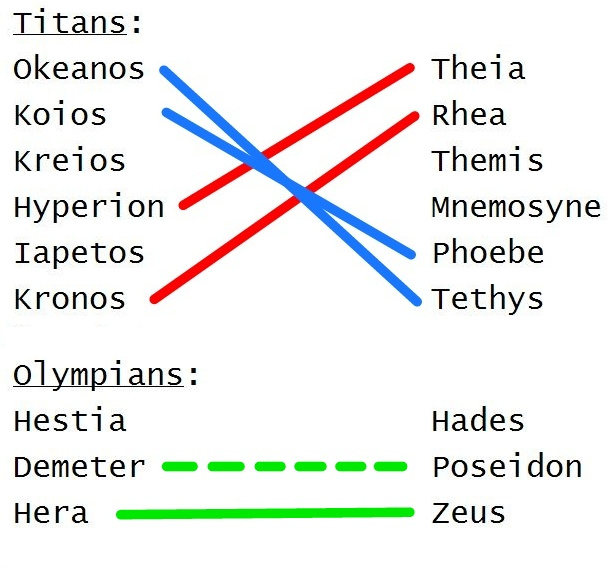

Hesiod attempts to derive the name Τιτῆνες (Titans) from τιταίνω (stretch, strive) (Th 207-). Perhaps the above illustration is an explanation of his view(1).
In ancient Greece, just as most everywhere, honour and status are age dependent. Siblings of the same sex are ranked according to their age and the first-born has a special place of honour. If this is true of humans, it must be even more important among the gods(2). So in a well-ordered society gods and people would find a husband/wife of their own rank. Here we see how Titans of very unequal status marry. The youngest, Kronos, who is to become King of the gods, acquires the second-ranked Rhea as a wife. All this goes without comment in the Theogony. I will call a relation like Kronos-Rhea an upward relation (from the male p.o.v.) and one like Okeanos-Tethys a downward relation.
These things do play a part in the human world. For instance the trope "hero wins the hand of the princess" can be viewed as an upward relation. The king (or his son) are conceptually the "best men" in the community. If there is a problem they cannot solve and the newcomer can, the latter has shown himself to be better and therefore worthy to be king. The princess is his prize, his future kingly status depends on her. There is a possible association here with winning by force or by trick. The downward relation is the case in Cinderella-like stories: the servant-girl who marries the prince.
But back to the gods: all this would not seem very relevant if it were not for the stories about the demi-gods (ἡμίθεοι), the sons and daughters of gods mating with humans (WD 159-60). This important group (found also in the Old Testament) plays a pivotal role in many if not most of the Greek myths. Relations between gods and women, or goddesses and men, are also either upward or downward. Achilles sprouts from an upward marriage, Peleus and the goddess Thetis; the result is a king. Heracles comes from a downward one: Zeus and Alcmene; the result is a servant: the child inherits the mother's status. I wonder if there is an ancient theory behind this, that unequal relations, "strife", is the cause of much trouble in the world.
There is another point about these demigods - they are not there anymore. They were beautiful - they are gone - they are worshipped. See scapegoats. Let us speculate a bit further on that. Both in Homer (Il 12.23-) and Hesiod (WD 157-, about the fourth generation who now live on the Isles of the Blessed), the demigods are looked back upon as glorious but gone. Is is possible that the semi-divine heroes themselves, as a class, are being scapegoated away(4)? See also the Hesiodic Catalogue of Women, book 5.201- with fragmentary but interesting references to Zeus' plan to get rid of the demigods, threats of war, the necessity for the Ionians to "choose the sea" and Apollo's role in this.
...or How Kronos gained his throne (Th 137-). This myth seems an obvious borrowing from Hurrian or Babylonian myths(5). But there could be another interpretation which is more down to earth and fitting in with the political situation I am trying to picture. It is also less primitive-barbaric and probably somewhat disappointing, like explaining a joke:
After the birth ofr Kronos, the youngest of the Titans, Earth (Gaia) produced a series of terrible monsters, the most terrible of which were Kottus, Briareos and Gyes, The each had fifty heads and aq hundred arms and father Ouranos hated them from the first.
This is what Hesiod tells us (Th 137-). To my mind this looks like a metaphor. "Hundred-arm" looks suspiciously like an archaic-size army unit, a phalanx or the precursor of it, trained to act like a single entity. So armies are springing up everywhere. Kronos knows a solution, in his attempt to become King of the gods. Putting it in simple terms: he separates the male and the female and sends the male across the sea. Voilà the first Greece-wide emigration policy, the
Ionian migration.
Now the separation of Male and Female (they do not take women with them) produces Desire, a very powerful goddess. This sums up the problem that Homer is angry about: for lack of girls, they go about abducting them. The same people that are supposedly going to Troy to punish them for stealing Helen. See here the irony that the Iliad is based on.
Note that Kronos' bold move makes him King of the gods. His epithet is often "Kronos of the Wicked Trick" (ἀγκυλομήτης) and he is The King in later Greek thought, so naturally opposed to the Zeus-based Olympian model. See here.